WB result of IκBβ Recombinant Rabbit mAb
Primary antibody: IκBβ Recombinant Rabbit mAb at 1/1000 dilution
Lane 1: Jurkat whole cell lysate 20 µg
Lane 2: HeLa whole cell lysate 20 µg
Lane 3: PANC-1 whole cell lysate 20 µg
Lane 4: HDLM-2 whole cell lysate 20 µg
Lane 5: MCF7 whole cell lysate 20 µg
Secondary antibody: Goat Anti-rabbit IgG, (H+L), HRP conjugated at 1/10000 dilution
Predicted MW: 38 kDa
Observed MW: 47 kDa
This blot was developed with high sensitivity substrate
Product Details
Product Details
Product Specification
| Host | Rabbit |
| Antigen | IκBβ |
| Synonyms | NF-kappa-B inhibitor beta; NF-kappa-BIB; I-kappa-B-beta (IkB-B; IkB-beta; IkappaBbeta); Thyroid receptor-interacting protein 9 (TR-interacting protein 9; TRIP-9); NFKBIB; IKBB; TRIP9 |
| Immunogen | Synthetic Peptide |
| Location | Cytoplasm, Nucleus |
| Accession | Q15653 |
| Clone Number | S-810-203 |
| Antibody Type | Recombinant mAb |
| Isotype | IgG |
| Application | WB, ICC |
| Reactivity | Hu, Ms |
| Positive Sample | Jurkat, HeLa, PANC-1, HDLM-2, MCF7, A20, EL4, mouse kidney |
| Purification | Protein A |
| Concentration | 0.5 mg/ml |
| Conjugation | Unconjugated |
| Physical Appearance | Liquid |
| Storage Buffer | PBS, 40% Glycerol, 0.05% BSA, 0.03% Proclin 300 |
| Stability & Storage | 12 months from date of receipt / reconstitution, -20 °C as supplied |
Dilution
| application | dilution | species |
| WB | 1:1000 | Hu, Ms |
| ICC | 1:500 | Hu |
Background
IκBβ is a member of the IκB family of proteins, which play a crucial role in regulating the activity of NF-κB transcription factors. IκBβ, like IκBα, can sequester NF-κB dimers in the cytoplasm, preventing their translocation to the nucleus and thus inhibiting the expression of NF-κB-dependent genes. Upon stimulation by lipopolysaccharide (LPS), IκBβ is slowly degraded and re-synthesized as a hypophosphorylated form that can enter the nucleus. This nuclear IκBβ can bind to NF-κB dimers such as p65:c-Rel, stabilizing them and promoting the expression of specific pro-inflammatory genes like TNF-α. Interestingly, IκBβ−/− mice show a dramatic reduction in TNF-α production in response to LPS and are resistant to LPS-induced septic shock and collagen-induced arthritis. This suggests that IκBβ not only acts as an inhibitor of NF-κB but also as a positive regulator of certain NF-κB-dependent genes, highlighting its dual role in the inflammatory response.
Picture
Picture
Western Blot
WB result of IκBβ Recombinant Rabbit mAb
Primary antibody: IκBβ Recombinant Rabbit mAb at 1/1000 dilution
Lane 1: A20 whole cell lysate 20 µg
Lane 2: EL4 whole cell lysate 20 µg
Lane 3: mouse kidney lysate 20 µg
Secondary antibody: Goat Anti-rabbit IgG, (H+L), HRP conjugated at 1/10000 dilution
Predicted MW: 38 kDa
Observed MW: 47 kDa
This blot was developed with high sensitivity substrate
Immunocytochemistry
ICC shows positive staining in MCF7 cells. Anti- IκBβ antibody was used at 1/500 dilution (Green) and incubated overnight at 4°C. Goat polyclonal Antibody to Rabbit IgG - H&L (Alexa Fluor® 488) was used as secondary antibody at 1/1000 dilution. The cells were fixed with 100% ice-cold methanol and permeabilized with 0.1% PBS-Triton X-100. Nuclei were counterstained with DAPI (Blue). Counterstain with tubulin (Red).


